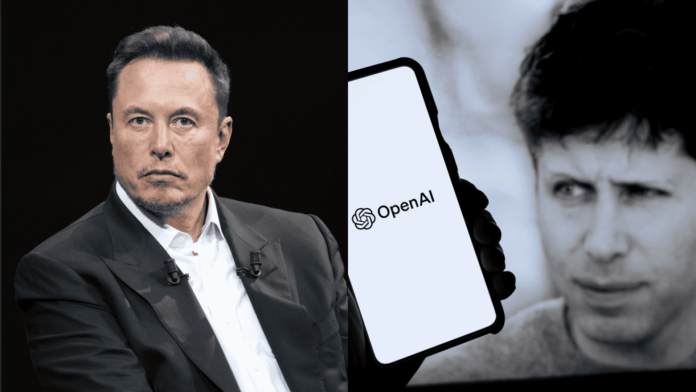
Key Case Takeaways:
- OpenAI countersues Elon Musk with vague harassment claims, raising doubts about the lawsuit’s legitimacy.
- Legal experts point to a lack of specifics in OpenAI’s lawsuit, suggesting it may backfire and cost them heavily.
- Musk’s legal position strengthens as OpenAI’s countersuit appears to misuse the judicial process for PR advantage.
By Samuel Lopez – USA Herald
San Francisco, CA – The legal clash between OpenAI and Elon Musk has erupted into a fierce new battle, but this time, OpenAI may have overplayed its hand.
On Wednesday, the ChatGPT maker filed a countersuit accusing Musk of harassment and claiming he “has tried every tool available to harm” the company. Filed in the U.S. District Court in California, OpenAI’s legal salvo follows Musk’s own lawsuit seeking to block OpenAI’s shift to a for-profit model — a case now headed for a jury trial next spring.
Yet despite the strong language, OpenAI’s latest legal move shows more theater than legal muscle. After two decades in the legal trenches — including hundreds of wins in harassment and restraining order cases across California — I can say with confidence: OpenAI’s harassment claims are flimsy, vague, and unlikely to survive serious judicial scrutiny.
At first glance, OpenAI’s countersuit looks dramatic. Statements like “Elon’s nonstop actions against us are just bad-faith tactics” sound explosive. But a closer look reveals a glaring problem: the suit is nearly devoid of hard facts.
In California, proving harassment isn’t a casual affair. Specifics matter. Courts expect clear examples — documented threats, obscene language, physical intimidation, stalking, or visual harassment. Vague accusations without dates, witnesses, or real-world examples just don’t cut it.
OpenAI’s complaint offers none of these. No allegations of verbal abuse. No claims of physical harassment. No incidents of visual threats. Just colorful language wrapped in conjecture.
It’s the equivalent of a soapbox speech in a courtroom — high on drama, low on admissible evidence.
Legal Overreach or Strategic PR Play?
It’s hard not to view OpenAI’s countersuit as a thinly veiled attempt to reframe the narrative. The lawsuit leans heavily on emotional appeals, painting Musk as a spurned founder who couldn’t handle OpenAI’s success.
“So Musk quit, declaring that OpenAI would fail without him and that he would focus on AI development at Tesla,”the countersuit says. It later adds, “Musk could not tolerate seeing such success for an enterprise he had abandoned.”
But how would OpenAI know Musk’s internal emotional state? Courts generally frown upon speculative mind-reading. Judges demand facts, not feelings.
In reality, OpenAI’s countersuit reads more like a press release aimed at tarnishing Musk’s reputation than a serious legal argument. Worse yet, by making such exaggerated claims without solid backing, OpenAI risks serious backlash from the court.
If OpenAI’s countersuit is tossed for lack of merit — a very real possibility — the company could be ordered to pay Musk’s attorney fees and costs. Even worse, the court could view OpenAI’s filing as a bad-faith abuse of the judicial process, opening the door for sanctions.
Potential Backfire for OpenAI
There’s a golden rule in litigation: Don’t insult the judge’s intelligence. Yet OpenAI’s countersuit appears dangerously close to doing just that.
Using sweeping phrases like “relentless campaign” without supplying facts is a rookie mistake. Judges are trained to spot fluff a mile away — and they don’t like it. Early missteps like these can poison a case’s tone for the entire duration of litigation.
Moreover, OpenAI’s countersuit risks exposing the company to heightened scrutiny. If a judge senses that a party is abusing the courts to score PR points, it’s not just bad optics — it can damage credibility across every motion, argument, and hearing that follows.
The lawsuit also accuses Musk of launching “malicious campaigns broadcast to Musk’s more than 200 million followers,” and making a “sham bid” to take over OpenAI. But again, there’s no detailed account of when these alleged campaigns occurred, what statements were made, or how they constituted legal harassment.
Seasoned judges demand receipts — screenshots, timelines, evidence. OpenAI provides none.
Setting a Dangerous Precedent
OpenAI’s aggressive countersuit doesn’t just risk failure; it also risks setting a dangerous precedent. Weaponizing harassment claims to silence competitors would erode free speech protections and encourage others to misuse courts to muzzle criticism.
In fact, the countersuit’s own language — harping on Musk’s failed takeover bid and referencing the Twitter acquisition saga — makes OpenAI sound more like a jilted ex-partner airing grievances than a wronged litigant seeking relief.
“Investors, partners, and employees saw what happened to Twitter when Musk took it over in 2022: the company’s value plummeted, business partners were left hanging, most employees were sent packing, and the business was ultimately absorbed into Musk’s AI company. Musk’s continued attacks on OpenAI, culminating most recently in the fake takeover bid designed to disrupt OpenAI’s future, must cease,” it declared.
If anything, OpenAI’s scattershot accusations lend credibility to Musk’s original lawsuit — that OpenAI has drifted from its founding mission and now prioritizes profit over principles.
What’s Next?
The case now heads toward an intense discovery phase. Musk’s legal team will likely move to dismiss OpenAI’s countersuit early, arguing that it fails to state a valid claim.
If the court agrees, OpenAI could find itself not only licking its wounds but also writing a check to cover Musk’s considerable legal fees.
Meanwhile, public sentiment could swing further in Musk’s favor. His supporters already view him as a maverick fighting bloated institutions. OpenAI’s weak countersuit only fuels that narrative.
In the end, OpenAI’s attempt to brand Musk as a harasser might backfire spectacularly — leaving the company looking desperate, not defiant.
Learn More:
For a deeper dive into legal strategies and high-profile lawsuits, join me on Patreon
About the Author:
Written by Samuel Lopez – Legal Analyst and Investigative Journalist for the USA Herald.


